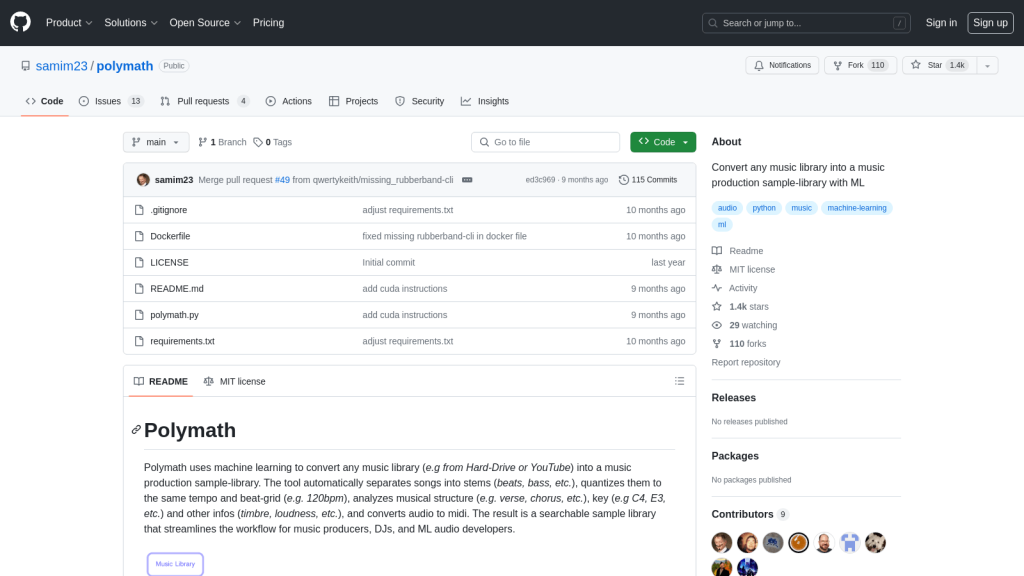What is Polymath?
Polymath is a creative artificial intelligence-based tool that empowers one to change any music library into a sample library of music production by the use of machine learning. The developer, GitHub user samim23, applies leading-edge ML algorithms to make the process of music production easier and more efficient for making customized samples and unique sound libraries by musicians or producers.
Key Features & Benefits of Polymath
Music Library Conversion— The present music library can be converted into a sample library with Polymath. Machine Learning-Based Sampling— It creates high-quality music samples using machine learning. Music Production— Offers the power to make music using samples seamlessly, streamlining sample creation, which becomes automatic and easy to be integrated into the previous workflow. Custom Sample Library Creation— Make your own and individual sound libraries.
Harnessing such features has a lot of advantages with regard to saving time in the music production process, generating much more creativity through unique samples, and, in effect, increasing the productivity of music production workflows.
Use Cases and Applications of Polymath
Polymath is an all-around utility, with applications along the value chain within the music business. The cases include:
- Generate Custom Music Samples: Musicians and producers can generate personal samples for their projects.
- Create Unique Sound Libraries: This feature will allow users to come up with unique sound libraries that would very easily identify it with their brand in the music market.
- Automate Music Production Workflows: The sampling process is automated by Polymath to increase ease and speed in the music production workflow.
Companies and Verticles that can Avail Polymath: The tool can be used by music production studios, individual musicians, and other audio content creators. User studies report that the productivity and creativity of the users increased substantially by using the tool.
How to Use Polymath
It is very easy to use the following step by step guide on Polymath:
-
Install the Tool:
You can download Polymath from its GitHub repository. You can then install the tool into your system. -
Set Up Settings:
Set up the settings by specifying the type of samples you need to generate. -
Create Samples:
Run the software to generate the custom music samples. -
Integrate with DAW:
Import the generated samples into your DAW and use them in further production.
Create top-quality music samples by ensuring that the music library you’re starting with is well-organized and the source files are of good quality. Understanding the UI and navigation of Polymath will make the whole process even better.
How Polymath Works
Polymath does work with the help of highly powered machine learning algorithms, which is evidenced through the analysis and processing done on music libraries. The workflow of the tool thus includes the following:
-
Data Intake:
Data by the user is uploaded from his music library to Polymath. -
ML Analysis:
The music files are passed through the ML models of the tool for recognizing patterns and extracting relevant features. -
Sample Generation:
Based on the conducted analysis, Polymath comes up with high-quality sophisticated music samples. -
Output Integration:
Users can, therefore, export these samples to use when running their music production projects.
Underlying technology at Polytechnic employs advanced algorithms, which result in keeping output samples with qualities and characteristics that of source music files.
Pros and Cons of Polymath
Just like any other tool, Polymath has both pros and potential cons that are possible:
Pros:
- Time-Efficient: Ability to set and generate samples has indeed been automated and, therefore, greatly takes the shortest time to output music.
- Helps create new ideas: These can be created from unique, custom samples.
- Integration: Works in a seamless way with many different DAWs, and can be an important part of any production setup.
Potential Drawbacks:
- Steep Learning Curve: Users may require significant time to fully understand and use all features.
- Dependable on Source: The quality of generated samples is heavily dependent on the quality of the input music library.
The effectiveness of Polymath is emphasized in user reports, but new users just have to take time to get acquainted with the tool to make the most out of it.
Conclusion on Polymath
Polymath is an extremely strong source for converting music libraries into production-ready sample libraries through machine learning. Both features—the ML-based sampling and the workflow being totally automated—form the key trunk on which every busy musician or producer leans. Variety: Its learning curve is actually very steep, but its very advantages make it go far beyond any shortcomings it might entail. And with every new update, Polymath will only get better and better.
Polymath FAQs
What is Polymath?
Polymath is an AI tool that uses machine learning to transform music libraries into music production sample libraries.
Who is this for?
Musicians, music producers, and audio content creators will benefit from Polymath.
Is it free?
Yes, it is free. Polymath is accessible via GitHub.
What can I do with it?
The main features are manifold: music library conversion, ML-based sampling, music production, and sample library making.
How to install
You can download and install Polymath from the GitHub repository of the project. You will need to follow these steps for setting up and using.









